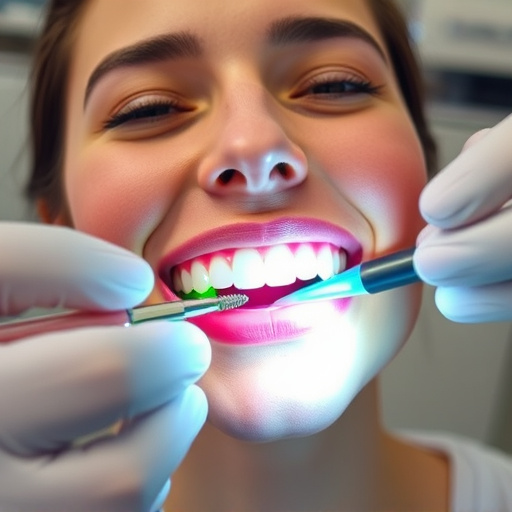Snoring is a common sleep disorder caused by relaxed upper airway tissues. Effective snoring treatment options address root causes like genetics, obesity, aging, and medical conditions such as sleep apnea. General dentistry practices offer solutions like tooth repair or crowns to support the jaw and stabilize the airway. Medical approaches include lifestyle changes (e.g., healthy sleep habits, weight loss), dental care (oral appliance therapy, teeth cleaning), and professional recommendations to improve sleep quality. Non-medical strategies like position adjustments and relaxation techniques provide temporary relief while professionals offer permanent solutions for snoring treatment options.
Snoring, a common yet disruptive sleep disorder, affects millions worldwide. Understanding both its causes and impacts is crucial for effective management. This article explores comprehensive snoring treatment options recommended by sleep professionals, encompassing medical approaches from prescription medications to surgical interventions, alongside non-medical strategies focusing on lifestyle changes and behavioral modifications. Discover the diverse array of solutions available for a quieter, more restful night’s sleep.
- Understanding Snoring: Causes and Impacts
- Medical Approaches for Snoring Treatment
- Non-Medical Strategies to Quit Snoring
Understanding Snoring: Causes and Impacts

Snoring is a common sleep disorder that can have significant impacts on both the snorer and their bed partner. It occurs when the soft tissues in the upper airway relax and vibrate during breathing, producing a characteristic sound. Understanding what causes snoring is crucial for determining effective snoring treatment options.
Several factors contribute to snoring, including genetics, obesity, aging, and underlying medical conditions like sleep apnea. In many cases, general dentistry practices play a role in addressing snoring issues, offering solutions that go beyond traditional snoring treatment options. For instance, dental professionals can recommend or provide procedures such as tooth repair or fitting dental crowns to support the jaw and improve airway stability, thereby reducing snoring episodes.
Medical Approaches for Snoring Treatment

When it comes to addressing snoring issues, medical approaches offer a range of effective snoring treatment options. These strategies are often recommended by sleep professionals and can be tailored to the underlying causes of snoring. One common medical solution involves adjusting one’s lifestyle and habits, such as adopting healthier sleeping positions, losing weight (if necessary), and avoiding certain medications that can exacerbate snoring.
Additionally, dental interventions play a significant role in snoring treatment options. Procedures like oral appliance therapy, where custom-made devices are used to keep the jaw forward during sleep, have proven successful for many. In some cases, emergency dental care or teeth cleaning might be necessary to address issues like gum inflammation or impacted wisdom teeth, which can contribute to snoring. The goal is to ensure optimal oral health, thereby improving overall sleep quality.
Non-Medical Strategies to Quit Snoring

Many individuals seeking snoring treatment options often start with non-medical strategies to address this common sleep disorder. One effective approach is adopting healthier sleep habits, such as maintaining a consistent sleep schedule and creating a relaxing bedtime routine. Avoiding stimulants like caffeine before bed and opting for relaxation techniques like deep breathing or meditation can also help prevent snoring. Additionally, losing weight through a balanced diet and regular exercise can significantly reduce snoring frequency, as excess weight contributes to the condition.
Another non-medical strategy involves adjusting one’s sleep position. Sleeping on the side, with the head slightly elevated, can open up the airways and alleviate snoring. Using specialized pillows designed for side sleepers or adding extra pillows under the knees can help maintain this position throughout the night. While these measures may provide relief for some, they don’t offer a permanent solution. Nonetheless, they serve as valuable first steps in managing snoring, complementing other snoring treatment options recommended by sleep professionals and contributing to better overall sleep quality.
Snoring can significantly impact quality of life, but with a comprehensive approach encompassing medical and non-medical strategies, effective snoring treatment options are readily available. Understanding the causes and effects outlined in this article is the first step towards a quieter, healthier sleep. Sleep professionals recommend integrating medical interventions for persistent cases alongside non-medical tactics to address lifestyle factors. By exploring these diverse avenues, individuals can find the best combination of snoring treatment options tailored to their needs, ultimately enhancing overall well-being during slumber.














